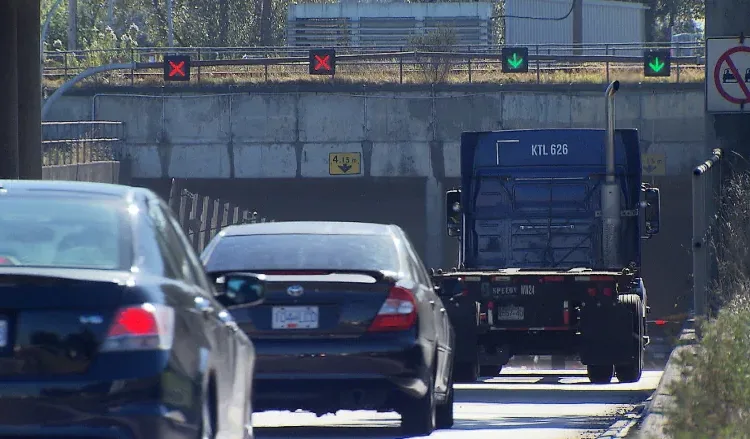Project to
An eight-lane tunnel under the Fraser River will replace an obsolete crossing that has been an increasing source of frustration for Metro Vancouver drivers.
The B.C. government says the new tunnel will connect the cities of Delta and Richmond on Highway 99 and cost $4.15 billion but won’t be complete until 2030.
“A new crossing to replace the George Massey Tunnel will improve traffic flow and make travel by transit, walking and cycling more convenient and attractive without costing commuters hundreds of dollars a year in unfair tolls,” said Rob Fleming, the minister of transportation and infrastructure.
Two of the eight lanes will be dedicated to transit and there will be separated pathways for cyclists and pedestrians.
Meantime, Fleming says the other projects have been launched along the Highway 99 corridor and the Steveston Interchange to help reduce congestion and traffic flow.
“This new crossing will ensure a strong and reliable connection along one of British Columbia’s most important trade corridors, while also providing people and families with more choices about how they travel in their day-to-day lives,” said Bowinn Ma, the minister of state for infrastructure.
The province says the tunnel option was chosen instead of an eight-lane bridge because it was endorsed by the regional district, causes the least harm to the surrounding area, including the river, and allows for work to start right away.
Work on the new Steveston Interchange and the Highway 99 corridor will begin this fall and is expected to be completed in 2025.
Former premier Christy Clark promised a 10-lane bridge during the 2013 election but the work was put on hold when the NDP took power in 2017.
Won’t meet Surrey’s needs
Surrey Board of Trade CEO Anita Huberman says the new George Massey Tunnel will not meet the needs of the city in 2030.
“The Surrey Board of Trade had advocated for an eight- to 10-lane bridge and is disappointed with the decision made by the B.C. government,” she said in a written statement.
“Surrey is still growing by 1,200-1,400 people a month, and with another 1.3 million people expected to arrive by 2030 in the Metro Vancouver region … the eight-lane tunnel, which is really only additional two lanes … does not meet Surrey’s needs to move people and move goods.”
The project will now go through a 3½-year environmental assessment process, with construction set to begin in 2025.
“The bridge was expected to have been almost ready by now. It’s unfortunate that we are back at square one.”
Trucking association pleased
The president of the B.C. Trucking Association, Dave Earle, says he was pleased to hear that an eight-lane tunnel will replace the current aging structure but worried it will still be some time until construction actually begins.
“We are looking at another 10 years, another 600,000 people moving to the Lower Mainland in that period when we are still going to be using that old tunnel,” Earle said.
He says only time will tell if the new tunnel will help truckers passing through.
“The drivers that are out there need to be at a given place, at a given time with their cargo and with that load, so they have to move … when the customer wants the goods,” he said.
“But we are not going to see those real shovels on the ground for another four years.”
Cyclists, who are unable to use the Massey Tunnel, celebrated the announcement.
Jeff Leigh, president of non-profit cycling advocacy organization HUB, said the current infrastructure means cyclists have to take a 20-kilometre detour or wait for a shuttle.
“The Massey Tunnel has been an obstacle for years,” he told CBC’s The Early Edition guest host Gloria Macarenko on Thursday.
Although the Richmond Chamber of Commerce has advocated for a bridge option in the past, in a written statement on Wednesday, CEO Dan Baxter says it is pleased with the decision.
“For the thousands of Richmond workers, employers, and residents, today’s announcement is a positive development.”
cost $4.15B and won’t be complete until 2030


